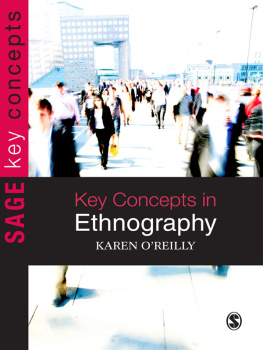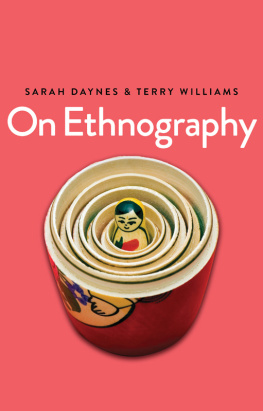First published in 2021 by
Berghahn Books
www.berghahnbooks.com
2021 Brian Moeran
All rights reserved. Except for the quotation of short passages for the purposes of criticism and review, no part of this book may be reproduced in any form or by any means, electronic or mechanical, including photocopying, recording, or any information storage and retrieval system now known or to be invented, without written permission of the publisher.
Library of Congress Cataloging-in-Publication Data
Names: Moeran, Brian, 1944- author.
Title: Ethnography in the raw : life in a Luzon village / Brian Moeran.
Description: New York : Berghahn Books, 2021. | Includes bibliographical references and index.
Identifiers: LCCN 2020042400 (print) | LCCN 2020042401 (ebook) | ISBN 9781800730748 (hardback) | ISBN 9781800730755 (ebook)
Subjects: LCSH: Filipinos--Social life and customs--21st century | Filipinos--Social conditions--21st century. | Philippines--Social life and customs--21st century. | Philippines--Social conditions--21st century. | Luzon (Philippines)--Rural conditions.
Classification: LCC DS663 .M64 2021 (print) | LCC DS663 (ebook) | DDC 959.9/1--dc23
LC record available at https://lccn.loc.gov/2020042400
LC ebook record available at https://lccn.loc.gov/2020042401
British Library Cataloguing in Publication Data
A catalogue record for this book is available from the British Library
ISBN 978-1-80073-074-8 hardback
ISBN 978-1-80073-075-5 ebook
Notes on Text
For the record, all the names of the people mentioned in this book are fictional. There are two exceptions. One of them is a public figure, the Mayor of Aliaga. The other is a local villager and friend who is happy about my using his common name.
In writing this book I have chosen, for ease of reading, to dispense with the customary use of citations when discussing anthropological theories, and to make use instead of a section-by-section list of Readings at the end of the book. Since the absence of citations in a text tends to make academics (and, perhaps, students) unhappy, I had probably better explain why I have adopted such a course of action.
First and foremost, this is a book detailing the everyday life of a fieldworker. As such, it is filled with details that often at the time seem insignificant and only later may, or may not, take on importance in the context of the research as a whole. Ethnographic data, therefore, are the be-all and end-all of anthropological theories based on fieldwork. They should, in my opinion, underpin and guide any theorising that later takes place.
I learned this important lesson when, as a doctoral student, I was told by my supervisor to write my thesis while I was still in the field. I had been fortunate enough to be granted a fellowship by a Japanese foundation for a second year of fieldwork. Since my supervisor was going to be in Tokyo for several months during that period, he thought it advisable that I write up the first draft of my thesis while he was in Japan and while I still had time to enquire further into research areas that I may not have fully followed up until then. He gave me three months to complete the task. I want a complete thesis, he said, with beginning, middle, and end. And make it readable.
And so I wrote a thesis while living in a remote valley in Kyushu in the south of Japan. I had no access to any academic books and therefore had to rely entirely on my fieldnotes to meet my supervisors demands. So I allowed these fieldnotes to tell their own story as I sifted through all my notebooks (remember, this was before the age of computers and the Internet). Two days prior to the deadline, I sent my supervisor a complete thesis with beginning, middle and end. (In fact, I had two beginnings, two middles and more or less two ends, because I hadnt then worked out how to integrate the social organisation of a pottery village with an aesthetic philosophy of folk art that guided my potters everyday work and social interaction.)
Writing a thesis without a single book to help or hinder my reflections was, I still think, the best thing that ever happened to me and over the years Ive advised my students to do the same when embarking upon their own thesis writing. (None of them has ever followed this advice!) Such an approach makes for a more readable story. It also shows clearly why its author adopts one theory rather than another when engaging with the serious side of his or her discipline.
Nowadays, of course, the Internet, computers and related digital media have radically changed the fieldwork experience. As fieldworkers, we are no longer totally cut off from the outside world, but allow it to impinge upon our everyday experiences. It is, therefore, possible to get hold of and read articles, even books, related to fieldwork interests and to incorporate them into ones reflections about where a particular set of ethnographic data might be leading in terms of theory.
The question is: how should this written material be incorporated in fieldwork that is still ongoing? Should you give it the finality that citations in the text itself impose? Or, given that your fieldwork is ongoing and that a different interpretation may emerge at a later stage of fieldwork, as well as after you have returned to the womb-like cocoon of a university, should you merely hint at the written material that has guided your reflections in the field?
For better or for worse, I have decided to opt for the latter course of action and include those readings that guided me in a chapter-by-chapter bibliography at the end of this book. Already, a year and a half after embarking upon fieldwork in Bibiclat (which has now amounted to a full twelve months in the classical tradition of anthropology), I feel hesitant about some of my preliminary conclusions. If I were to read more and study more, I might well change them. As a result, I do not feel confident enough about what I have written to put citations of any kind in the text that you have before you.
There is another reason for this decision. Citations, these days, are very much the business of academia, both in their quantity and their status. Whether a particular scholar is cited at all, how often s/he is so, and in which journals, has a bearing on their academic appointments and promotions, and, less directly, on the management and structure of universities themselves (through the appointment of department heads and faculty deans who may initiate structural changes affecting the lives of the staff under their command).




